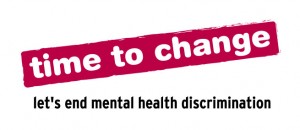 You have probably seen the latest government ”time to change” campaign to end discrimination that people who have mental health issues face in the workplace and in society in general. I say “the latest campaign”, but that suggests there have been others. If there have I’m afraid they passed by me unnoticed.
You have probably seen the latest government ”time to change” campaign to end discrimination that people who have mental health issues face in the workplace and in society in general. I say “the latest campaign”, but that suggests there have been others. If there have I’m afraid they passed by me unnoticed.
I’ve been a therapist now for some time and I’ve always thought we in the UK have had a bad attitude to mental health issues. The general “stiff upper lip” approach has been accepted as the norm in most areas of British Society. Unfortunately, this has led to people finding it difficult to get over the stigma of seeking help for mental health issues and suffering in silence, in some cases, for decades.
Our poor attitude to mental health.
If you fell over and broke your leg then you would take yourself to the hospital and receive medical attention, probably have a cast on for a while and then be right as rain. Can you imagine if you applied the same attitude that is shown to mental health issues like depression or stress to this physical condition?
“You don’t need to go to the hospital with that broken leg, pull yourself together – you’ll be alright in a few days!” or
“I can’t believe he has taken time off work just because his foot is facing the wrong direction. We’ve all had leg problems and most of us just get on with it.”
It sounds ridiculous when you apply it to such a physical ailment and it would be unbelievable for anyone to comment in such a way, so why do we do that with mental health issues?
Time To Change
I guess this is exactly what the “Time To Change” campaign is asking and I think, slowly, attitudes to mental health issues are changing for the better. I find it fascinating that when people discover that I’m a therapist, many of them “come out” as having had therapy themselves. Most of them tell me what a life saver it was for them and feel that it was an important part of their lives.
I find it interesting that the same people are a great deal more reluctant to discuss this with family or friends, and mentioning it to their work colleagues is an out and out no no.
Do Men Suffer Most?
Out of the two sexes I think men suffer from this problem the most. Us men have this idea that we need to “be strong”, especially around other men. Being seen to need help and support with mental health issues is tantamount to cashing in your masculinity for a frilly skirt and high heels. How badly we get things wrong at times!
I love Claude Steiner’s idea in “The Other Side of Power” that to be in touch with your feelings and to be able to express them appropriately is what makes us all truly powerful. To be able to seek help when we need it whether it’s for a broken leg, depression or stress is one important way we can look after ourselves. And it’s only by looking after ourselves that we can look after others. A fully functioning healthy adult is much more capable at serving loved one’s needs than someone with their own internal battles going on.
Time to Change Our Attitude To Mental Health
I fully support the governments “Time To Change” campaign. I would encourage all those (like me) who have had help with mental health issues to “come out” and talk about it openly. It’s time to change. Let’s start to break down this limiting belief that needing support for our mental health issues is some sign of weakness, because in my opinion, it’s the opposite. Those that have the presence of mind and the self-belief to do this are the strong ones. It’s time to change.
